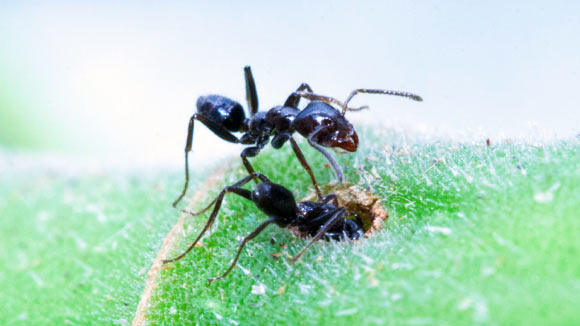Azteca alfari, a tropical ant species found in North and South Americas, is better at limiting pathogenic microbes in its nest chambers than humans, according to a new study published in the Proceedings of the Royal Society B.
“The microbiome of each human dwelling is unique to its inhabitants, and the microbiome of each room is unique to the purpose of the room,” said University of Idaho researcher Jane Lucas and her colleagues.
“For example, not only is the microbiome of your bathroom — hopefully — different from the microbiome of your kitchen, but the microbiome of your kitchen is distinct from the microbiome of your neighbor’s kitchen.”
“These microbiomes can have positive and negative effects on our health, and humans actively influence the microbial community of our dwellings with a range of techniques, from using anti-bacterial cleaning products to taking probiotics.”
“We now know that ants also have unique microbiomes, both from colony to colony and even between chambers within a single colony.”
Dr. Lucas and co-authors examined colonies of Azteca alfari ants in trumpet trees (Cecropia peltata).
These ants utilize the naturally segmented stalks of trumpet trees as separate rooms to rear young (brood chambers), store food (carton chambers), and take breaks (worker chambers).
Like humans, they actively influence the microbial communities of a room by doing things that favor good microbes and suppress the bad.
In fact, they are much better than humans at suppressing potentially harmful microbes in their brood chambers, which are the equivalent to our daycare centers.
This may be due to the structural changes ants make to brood chambers and their intense cleaning rituals.
“Ants have been living in homes for more than a hundred million years,” said co-author Professor Rob Dunn, from the Department of Applied Ecology at North Carolina State University and the Natural History Museum at the University of Copenhagen.
“During that time, they’ve figured out a thing or two about making a nice apartment.”
”This work gives us a glimpse into the housekeeping of one tropical ant species. And that housekeeping appears, at least given the evidence to date, to be more microbially sophisticated than anything we do in our human homes,” the scientists said.
_____
Jane M. Lucas et al. 2019. Azteca ants maintain unique microbiomes across functionally distinct nest chambers. Proc. R. Soc. B 286 (1908); doi: 10.1098/rspb.2019.1026








